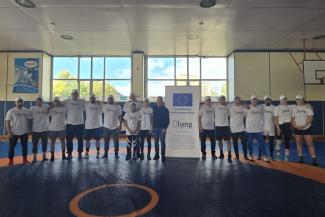Beach Wrestlers Inam, Marsigashvilli on Golden Collision Course
Friday, May 10, 2019 - 21:23 By Tim Foley

RIO DE JANEIRO (May 10) – With 6000 miles of travel logged in the past 48 hours, Muhammed INAM (PAK) should have limped onto the Rio sand and groggy and bleary eyed. But on Friday afternoon, the two-time defending Beach Wrestling World Champion showed no signs of fatigue, winning his opening two matches.
Inam, who cruised 3-0 in the opening round, ran up against experienced wrestler Kanan ALIYEV (AZE) in the second round. The match started slow, but Inam exploded with a flurry of action at the edge of the circle to earn a one-point step out on a three-point takedown attempt that was deemed out of bounds. Inam would control the center for the remainder of the
“I’m feeling very good in my matches,” said Inam. “Tonight, I will watch videos and prepare strategies for tomorrow’s opponents, especially the Georgian. I will prepare techniques to try and beat him … because he is amazing.”
On the other side of the 90kg bracket “The Georgian” Dato MARSIGASHVILLI – who won the BWWS stop in Chaves -- had a tough first-round battle ceding two points to Grigorios KRIARIDIS (GRE) before scoring back-back-back takedowns to win 3-2. In the second round, Marsigashvilli quickly disposed of Brazil’s Andre Luiz RAMOS PINTO (BRA).
With one pool match to complete in the morning Inam and Marsigashvilli are headed for a gold medal showdown in the evening finals.

In women’s beach wrestling, Aline De SILVA FERREIRA proved to be golden winning her first beach wrestling series event. She Brazilian, who won a world silver medal on the mats in 2014 was all smiles after learning she was taking home 1000 CHF for her efforts.
“For me beach wrestling is good because I like to shoot high crotches,” said Silva. “The girls here are a little slower than me and I can use my strength.”
Silva also gushed about the new wrestling style and her hopes for its future in Brazil. “I like the way beach wrestling is organized – and it’s beautiful. I brought friends and they like its short time and rules are simple. It’s a great part for people in Brazil to learn wrestling. We have a lot of beaches.”
Wrestling continues tomorrow morning at 10am local time, following by the finals of the Beach Wrestling World Series are set to start at 2pm local.
Full results from day one can be found, here: https://unitedworldwrestling.org/event/rio-de-janeiro-beach-wrestling-world-series?tab=results


Share your thoughts.
Comments